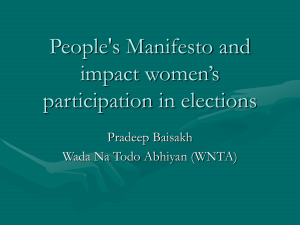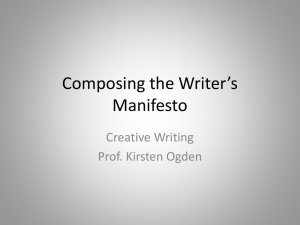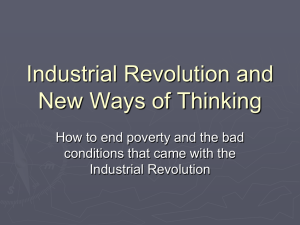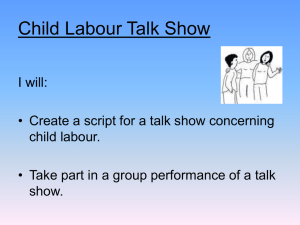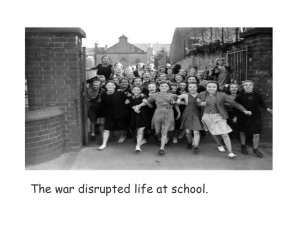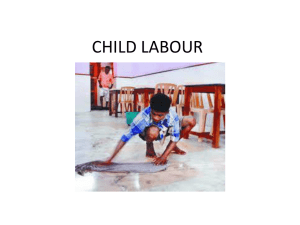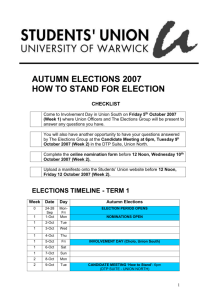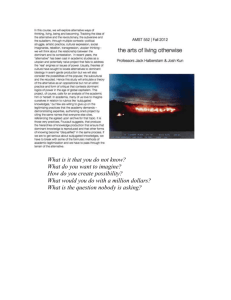Get ready for the 2015 general election achieving impact and
advertisement
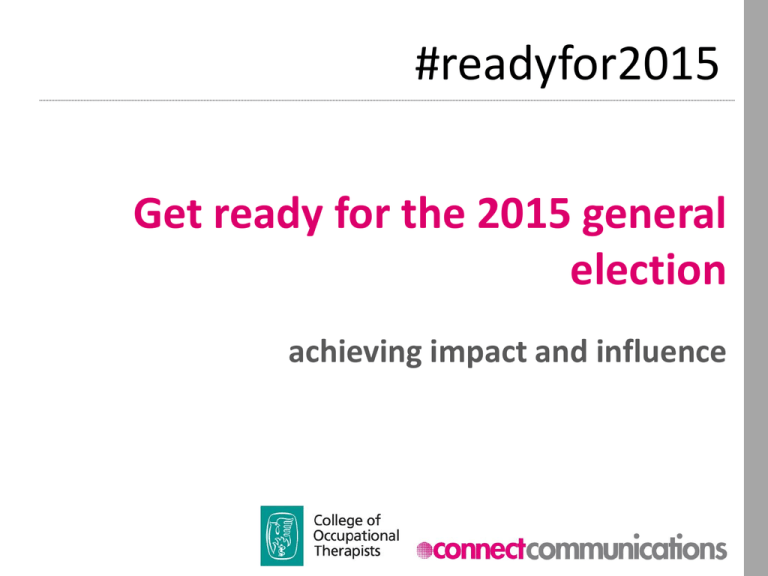
#readyfor2015 Get ready for the 2015 general election achieving impact and influence Who are we? Sara Petela Public Affairs Officer The College of Occupational Therapists Emily Wallace Director Connect Communications sara.petela@cot.co.uk e.wallace@connectpa.co.uk This session • • • • • • • Politics and what it means for COT The political timetable and road to 2015 Polls and pundits – what are they saying Big picture political positioning Health in the manifesto’s COT - looking ahead Working better together How political are you? Why is politics important for COT • • • • change policy and priorities raise profile of people/issues/organisation manage and motivate members manage and build your reputation and recognition of your organisation • extend your networks • generate positive relationships – with stakeholders, partners, media Forthcoming elections 2014 2015 2016 2017 English local government UK Parliament National Assembly for Wales English local government Scottish Parliament Mayoral elections Northern Ireland local government London Assembly Scottish local government European Parliament English local government Referendum on independence for Scotland English local government Mayoral elections Mayoral elections Northern Ireland local council Mayoral elections Northern Ireland Assembly** Mayor of London Police and Crime Commissioner (England and Wales) The next year in politics 4 June Queen’s Speech Summer reshuffles Official campaign and manifesto launches 18 September Scottish referendum Sept / October Party Conferences 7 May General Election 30 March Electioneering Dissolution of Parliament New Government Polls and pundits Scottish referendum The polls are narrowing 50 45 40 35 Yes 30 25 No 20 15 10 5 0 May 2014 Big picture positioning? Conservative key messages we’re on the right track Labour hasn’t changed and they can’t be trusted on the economy we need to keep going for the long term security of the country we would be even better with a majority Conservative Government Labour key messages a recovery for all, tackling the cost of living crisis One Nation we must devolve money and power to local communities the Tory Government is out of touch Liberal Democrat key messages the country needs us in government as an anchor to the centre ground we have softened the hard edges of the Conservatives Labour still can’t be trusted to govern alone Health and social care big messages Privatisation: you cant trust Cameron with the NHS The NHS is safe under Labour Integration integration integration No new money Quality and safety: You can’t trust Labour with the NHS The NHS can’t afford another Labour Government The Conservatives’ Health Manifesto The Conservatives’ Health Manifesto Unpopularity of health reforms identified as one of top ten election “risks” for Conservatives Likely health policy campaign themes • • • • • • No more structural change End of soviet tractor type targets Integration and improved social care, possibly including social housing More private providers – but managed market Positive about personalisation agenda The “Patients’ Party”? Labour’s Health Manifesto Labour’s Health Manifesto NHS identified as one of the top election assets for Labour Likely health policy manifesto themes: • • • • • • Whole person care An integrated health and social care service fit for 21st century Social care free for all at point of use and staff into the NHS? Repeal (parts of) Health and Social Care Act Focus on limiting marketisation/privatisation with a move back to preferred provider model Devolve all funding to local authorities (with no ring fence and CCGs to become advisory)? Liberal Democrats’ Health Manifesto Liberal Democrats’ Health Manifesto Health policy campaign themes • • • • • • Better and more integrated care Dignity at home – transforming social care Dilnot cap on social care costs More focus on mental health More mutual providers More democracy – strengthening HWBs What are we doing Strategic aim: Be the voice of the profession Recent successes include: • Professional Advisor for Children & Young People appointed as an Expert Advisor to Lord Freud • CEO about to complete 3 year term as a Social Care Fellow for NICE • Sit on numerous committees and advisory boards; e.g. DFE advisory panel on developing the SEN Code of Practice • Influenced the Care Act 2014 • Respond to hundreds of consultations across all four countries Looking ahead What’s on our radar? Current and upcoming areas of focus include: • • • • • • • Integration Prevention and early-intervention Reablement Vocational rehabilitation Children with SEND Age-friendly communities Public Health Working better together • • • • How can you help? Tell us what you’re doing Share feedback on our activities Send us case studies and evidence - from you and your service users • Be politically active in your local area – write to your MP, host site visits, attend MP surgeries and ask questions, etc Any questions what’s the difference? PR PA • management of internal and external comms to create and maintain a positive image • promotion of an organisation or cause amongst political or policy audiences • primarily engaging with a public audience • primarily engaging with politicians, officials and other stakeholders • often through the media, but also involves launches, events, social media • through legislation, regulation, and policy formation know what’s going on • • • • • • political monitoring media/social media political parties and manifestos conferences and events trade bodies and partners networking who influences? Political parties Other trade unions The Opposition Ministers & former Ministers Business and industry Campaign groups Decision maker Think tanks Formal/informal advisors Blogs Civil Servants Public opinion Peers MPs Select Cttees Media Social media current relationships? • • • • • • advisers Ministers/Government MPs officials who are your media key advocates? supporters/allies • industry/sector the who • where are your strongest relationships? • who are your most influential advocates? • are you effectively communicating to decision makers? • are your supporters and advocates speaking on your behalf? the what • what are your key messages? • what arguments have the most impact? • are there different messages for different audiences? the how, when and what! • one-to-one meetings • events • Parliamentary event • stunts/lobbies • research/briefing • media and social media • case studies/advocates • coalitions and partners • using members • Parliamentary activity • opinion polling • party conferences segment your stakeholders rank your stakeholders what could you rank? • importance o now o in the future o on policy o for income • accessibility • statutory role • degree of support • geographical location • influence • potential to grow relationship • strength of relationship top tips • know what you are trying to achieve • find out who is making the decision and who is influencing them • keep up to date with changing circumstances • understand the difference between policy and politics
